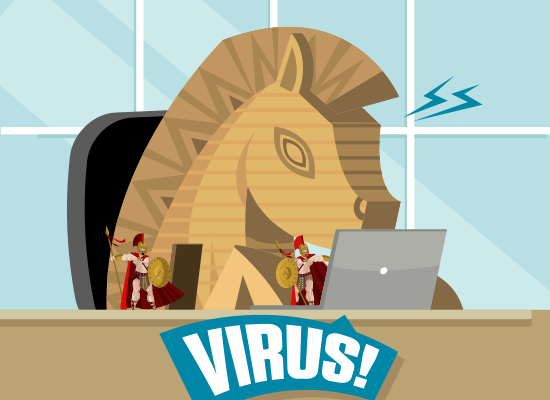Trojan malware is a malicious software designed to gain access to your computer without your knowledge. Once installed in your device, it can be used to steal information or damage the system.
It is one of the most common and damaging types of malware out there. It is very important to educate yourself about how they work, how they can be avoided, and how you can fight them.
One of the best ways to protect your devices at risk is to use a trojan remover tool. However, before you take steps to remove the malware, it is best to spot them in your applications. Below are described some steps for the removal of trojan malware from your system:
How Does Trojan Spread?
Trojan malware can travel to your system in many ways. Some of the most vulnerable places are internet downloads, email attachments, affected websites, and hacked internet networks. Speaking about the files they damage the most are music records, software files, and video games.
How to Prevent Trojans?
Did you know that you can also prevent Trojan horses from attacking your computer in the first place? If not, let us clue you in. There are certain ways to prevent Trojans from entering your computer and keep your files safe. It is one of the finest methods to keep your data safe from malware attacks of all types.
Some of the effective ways are discussed below:
- First of all, you should make a cloud storage account to store all files and data. This will help recover them whenever there’s a need.
- Add a second credible email address to recover your account in case of any emergency.
- Don’t download any files or software from public Wi-Fi. And if you do, make sure to always use VPNs.
- Don’t open or download email attachments without first confirming from the sender.
- Always use anti-malware software on your computer that will provide synchronized protection.
How Can Trojan Virus Affect Your PC?
There are many ways in which the Trojan virus can affect your PC and sensitive files. It takes the shape of any program or software that you normally use on your PC. After you open that file or install the affected software, the virus will enter the system and will break down the security protocols.
Trojan acts like spyware and creates backdoors to your security system. It can even detect your online passwords and credit card details.
If you notice that your PC language has changed somehow and you have nothing to do with it, it is probably a sign of a Trojan attack. Moreover, it also has the ability to slow down the speed of your computer system.
Steps to Remove Trojan From Your PC:
- Spot Them: One of many ways to spot a Trojan in your system is by using the task manager. Open task manager on your device, go to processes, and end the harmful software that you spotted on the system startup.
- Restart the Computer: Now it is time to restart your computer in the safe mode.
- Uninstall Affected Files: Once you have restarted the system, go on to uninstall the files or programs attacked by this malware.
- Delete Remaining Files: Now that you have successfully uninstalled the affected files, don’t forget to delete the root directory and remaining files of that application.
- Install Anti-Malware: After you have removed the harmful files from your computer, ensure to install an anti-malware program to protect your PC from future cyber-attacks.
Conclusion:
The digital world is continuously evolving and so are phishing attacks. Hackers are trying different ways to access sensitive information on your computers. Using an authenticated anti-malware program on your PC can mitigate the risks of cyber-attacks.
In most cases of a Trojan attack, users don’t even know what happened before it’s too late. Once a Trojan enters your PC, it starts to log your keyboard strokes and causes security breaches. To ensure maximum security on your computer, don’t download and install unverified programs.
If you are already running suspicious programs on your computer, it is strongly recommended that you remove or uninstall them at once. Try to follow the above-mentioned procedures to prevent and protect your devices from Trojan attacks.
